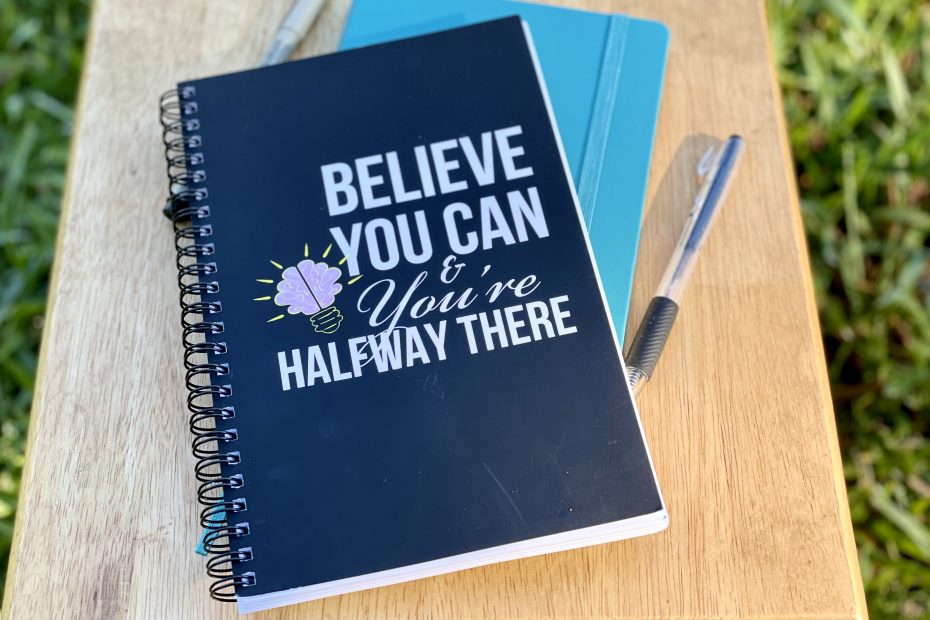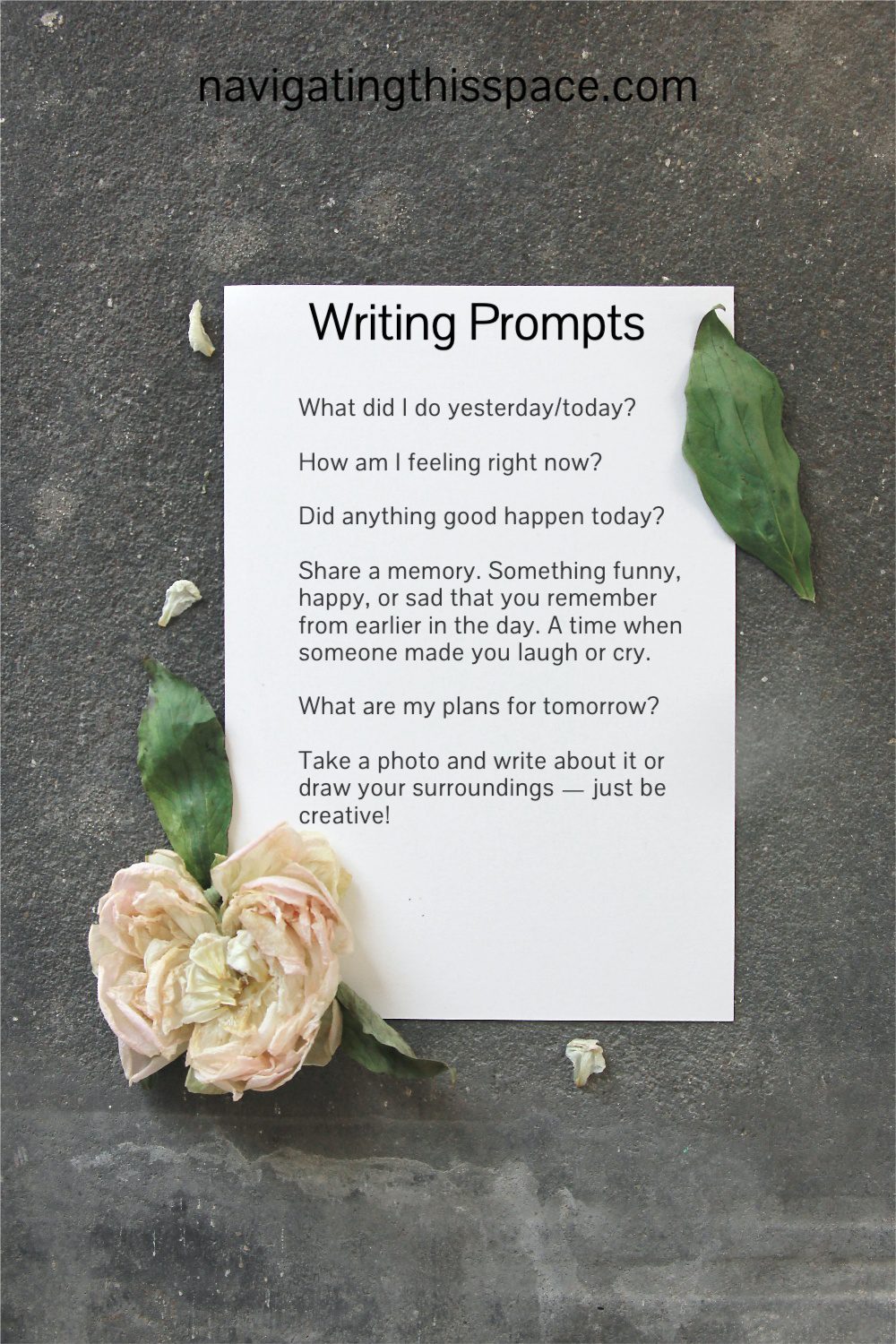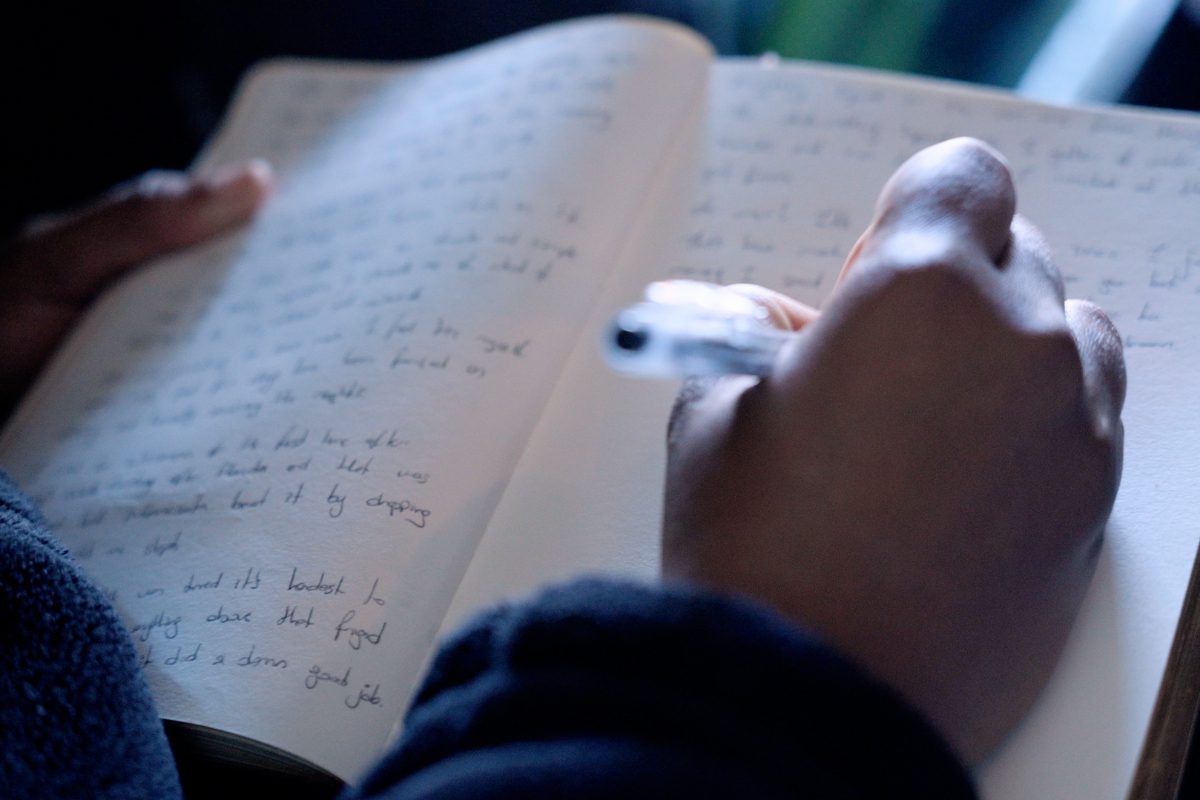The act of journaling has many long-term and short-term benefits. One way to reap those benefits is by making journaling a daily habit. But, many people struggle with journaling daily or even weekly. It can seem a bit overwhelming to try journaling for the first time and even more daunting to keep up with this habit for an extended period.
But, it’s possible to journal successfully daily. If you’re ready to start journaling and have trouble finding the motivation or time to make it a daily habit, consider these 7 Tips for Journaling Daily to make the process easier for you!
Journaling Tips for Beginners
1) Keep It Simple

Don’t try to overcomplicate journaling.
You don’t have to start with the most expensive notebook or even the fanciest pens. You could always use one of those fancy, color-coded notebooks or a simple composition book.
All you need is something that works for you. When you overcomplicate things, it starts to take on an impossible persona. That’s the opposite reaction of what you should be trying to achieve with journaling.
Think about it this way. If a seven-year-old can write a “dear diary” entry, you can fill that blank page staring back at you.
Even though the question, “What should I journal about every day?” may still be haunting your mind, the best advice is don’t force yourself to figure out what you should be writing about.
Write whatever you want. Remember, your journal pages need not be a work of art or even make sense if you don’t want it to. It’s a sacred place where you can write about anything and everything that crosses your mind.
A simple journaling tip to start writing now is to pick one word (joyful, grateful, thankful, love, or worry), focus on that word for about 30 seconds, what does it mean to you, and how does it relate to your thoughts and your life now. Then, write whatever comes to your mind.
2) Give Yourself Permission

If you don’t want to write for a day but would rather go outside and spend time in nature, do that instead. Then, come back and journal about how you feel after.
Do not pressure yourself to journal when you don’t feel like it because that will only lead to frustration. Journaling is a release of your thoughts and emotions. If you’re not experiencing a release when writing, then it’s the wrong time to write.
Don’t worry about how much you are (or aren’t) writing, a quick two-minute brain dump every morning might be what you need to get going with your day. When you don’t feel like writing, do what you think you need, and journal when you truly want to.
Give yourself room to breathe, to feel, and to have fun, so the ideas and words can start to flow and keep flowing.
3) Find a Rhythm

Every day is different and so are our moods. You can have off days, but those could be the exact days you need to be writing to release those pent-up emotions and chaotic thoughts.
Schedule your writing sessions on what works for you.
For example:
If you’re a morning person like I am who wants to cross off most of her to-do list before 8 a.m., then schedule your journal writing either before you start on your list or after so you’ll have more to write about.
I love writing in my journal as soon as I wake up because it allows me to record my dreams since they’re still fresh in my mind and decipher my thoughts before other people are awake and the phones and emails start rolling in.
A cool trick to engage the brain and give it a little push is keeping a journal and pen somewhere you can see it often so you’ll be reminded to stop and write.
Having your journal on your nightstand or in the bathroom can certainly give you plenty of opportunities or excuses to write. The best place for me is the kitchen counter, where I see it as soon as I walk out of the bedroom.
Action step: Keep your journal and pen in plain sight to create a visual reminder to write.
4) Just Start Writing

The most difficult part of journaling is the actual writing, but once the words start to flow, it’s a very liberating experience.
Start writing!
It doesn’t matter if your words on the paper are reflecting the confusion in your head. The main thing is that you’re getting those words out of your head and into this realm by using a pen and paper.
For example:
A sample journal entry:
“I don’t know what to write this morning. It’s early, around 4:30 am, and I can’t sleep. Yay! insomnia! I wish I could get some actual rest. I’m tired of being tired! I guess that’s what’s bothering me, I’m tired …”
Now, I don’t recommend turning the lights on when you’re trying to get some rest. However, if you need to release your thoughts, then go right ahead.
To reiterate what was mentioned above, keep it simple. Make journaling feel like you’re talking to yourself out loud.
5) Use Prompts and Techniques
Use what’s already available as an inspiration and a way to channel your inner thoughts. You can find hundreds of different types of journal prompts on the web, search Pinterest for “journaling prompts,” and see for yourself.
From prompts that promote self-love, self-discovery, success, personal growth, creativity, and many more topics, the topics to choose from are endless.
You can also create your own prompts to make them more personal and unique.
Journaling techniques like skipping lines, writing backward, and drawing pictures to describe the emotions you feel can be powerful ways of expressing your feelings.
Whatever technique(s) you choose, make sure it’s something that helps you get in touch with your mind and allows your creativity to flow without fear of the unknown.
Action step: Start your journal writing tomorrow at your scheduled time with a prompt or with morning pages. “Morning pages” are fancy words for saying to write what’s on your mind or your stream-of-consciousness.
6) Channel Your Feelings

Feelings are one of the most difficult subjects to write about mainly because we’ve been taught that feelings are weak.
Well, whoever taught us that was dead wrong.
Feelings are what make you human, and developing the ability to write about exactly what you’re feeling will increase your emotional intelligence.
At first, you may not be able to put into words how you feel but constantly writing about them will develop your mind to be able to articulate what’s going on internally.
Start by asking yourself what went well today, what didn’t, what do I wish to change, what do I treasure? How am I feeling right now?
Write about it all in your journal.
If you can only write about the symptoms you’re experiencing, you can google those symptoms and identify the exact emotion.
Diving deep within your mind and understanding how and why you’re feeling the way you are is one of the many benefits of journaling. Benefits also include mental health, emotional health, and much more …
Journaling daily will help ease the burden of negative emotions such as stress, anxiety, fear, confusion, resentment, and all the other things you need to work through. It’s literally like having a therapist on call 24/7.
When you keep a journal on a consistent basis, you’re showing yourself that you believe in your ability to change, and you’re curious about what’s going on inside of you.
7) What Are You Grateful for?

Grab your journal and start writing about what you’re grateful for, the hard things and the happy moments of your day, your physical health, your goals and dreams in life, your love for yourself and others, and all of the other things you’re grateful for.
Showing gratitude for what you currently have will invite what you need in your life. Developing a regular practice of gratitude writing is a great way to become more aware of your life and recognize what’s truly valuable in it.
Each day, decide on one thing in your life that you’re grateful for and journal about it. Why is that one thing your gratitude choice and how has it impacted your life? Explain your answer in detail. You might be surprised by the reasons your brain comes up with.
In the beginning, you may have to force yourself to write about what makes you grateful, but once your brain develops a pattern of noticing what’s good in your life, it will make writing about something negative easier.
The more journal entries that reflect your gratitude for the important thing or things in your life, the more those things will keep coming to you.
Journaling is like a direct way to manifest your thoughts into reality, and when you journal regularly, you’re only increasing your chances of living the life you want to live while learning how and what makes you tick.
Make It Work for You!
There is only one rule to follow when it comes to journaling. Do what works for you!
Journaling is supposed to be fun and relaxing! This is why it’s recommended that you do it whenever you feel like it. Night or day, morning or afternoon, or whenever you desire. The great thing about journaling is that you can do it anywhere at any time!
If you’re not feeling like writing, don’t force yourself to do it. It will stop being enjoyable, and that defeats the purpose of journaling. Journaling should free your mind and maybe even your heart, not cause you more stress.
If a particular thought or idea is taking over your mind, write it down!
You can’t unthink something. So, by writing it down and focusing on the positive and negative aspects of that thought, you will help yourself realize how helpful or destructive it is and what it means to you.
Set time aside for yourself every day to help train your mind to focus on the positive, the negative, and the mistakes to understand things from different perspectives. It’s also a great way to record your life experiences, especially when those experiences involve other people close to you.
If you’re constantly asking, “How can I improve my journaling?” remind yourself of the reasons why you journal and what it means to your life. This will help you remember why you journal in the first place, which helps keep things fun, engaging, and fresh!
Keep in mind that things probably won’t go smoothly in the beginning.
It took me years before I started writing in my journal every day. And to this day, I still miss some days because life has a way of happening.
When journaling becomes a habit, you’ll find that it becomes easier to remember to journal every day because you will look forward to doing it! Make sure you do what works for you, so that you can enjoy journaling and get the most value out of it.
There’s no right or wrong way when it comes to keeping a journal. And there are no right or wrong tools to use. There are many types of journals you could use to journal throughout the day.
From bullet journals, unruled blank pages to ruled pages, the choice and preference are ultimately yours. Go with your mood and create a routine that works for you.
My last and final tip is to get started journaling today, and you will never regret getting to know yourself better!
Thanks so much for reading. I hope you found my tips helpful, and I wish you a great day!
If you have any questions or comments, feel free to leave them below. I would love to hear from you and help in any way that I can.







Just what I need. Trying to get into this flow, thanks for the tips.
I’m happy your found the article helpful Lani, thanks for reading and leaving your feedback, I appreciate it.
I used to journal all the time when I was younger, but I fell out of practice. This might help to get me back into it.
I hope it does help you reconnect with your journaling Krysten, thanks for reading!